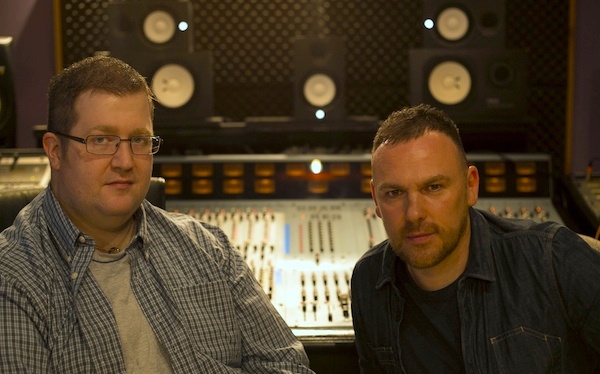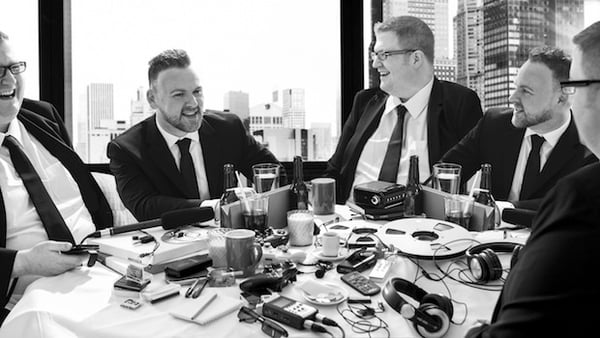The Pro Sound Effects How I Work series (inspired by Lifehacker) asks Hybrid Library owners what inspires them and what tools and routines help them get work done from day to day.
This interview is How I Work #2 - see below for other interviews in the series.
Name: Will Morton
Occupation: Game Sound Designer
Location: Scotland, UK
Company: Solid Audioworks
Most Recent Project: Grand Theft Auto V
DAW of Choice: Reaper
What is your current studio/workspace setup like?
Desk and PC
- Dual monitor setup for stereo work which I alternate when mixing:
• pair of Dynaudio Airs, which are wonderful
• pair of Wharfedale Diamond Hi-Fi speakers
- It's always better to check on different set-ups to get the mix sounding polished on consumer gear as well as higher-end monitors
- Surround monitor setup for... surround work:
• based around a set of Tannoys - I used Tannoys at college and fell in love
- Dual monitor screens:
• top screen with video preview, mixer controls, plugins, etc.
• bottom screen with the main Reaper window
- 4TB hard drive permanently connected with my sample library
- USB hub for dongles (seems a waste, but is a must)
- Vocal booth behind me with a monitor for ADR:
• Sennheiser MK4 almost permanently connected - it's just a fantastic all-rounder for dialogue recording
• A mountain of other mics I use for studio and field recording: from classics like the Shure SM58 through Rode NTG2 etc., always in even numbers so I can do stereo micing
- A couple of MIDI devices. For music I'm generally more of a 'step-entry with a qwerty keyboard' type of guy, but having MIDI controllers at hand is always useful - after all the only way to capture performance is to perform:
• M-Audio semi-weighted full size keyboard
• Novation Launchpad and an Akai MPK Mini keyboard on a sliding shelf under my computer keyboard
• Korg Nanokey that I take out and about with a laptop because it is so slim
- Box in the corner holding mic stands when out of use, but ready to grab at a moment's notice
- Shelves with boxes and bags of field recording gear (blimps, adapters, recorders, batteries, cables, mics, backup gear, etc). It's all packed ready for use so whether it's a big or small recording job I can pretty much pick up what I need and leave the studio with no preparation.
How long have you been a freelancer?
I left my in-house position at Rockstar early this year, so I've had the better part of a year to get my business up and running.
What is one thing you know now you wished you had known 5 years ago?
Just how big the world of audio is when you go freelance. Being an in-house sound designer working on one series of games for the majority of your career means that you get focussed on one product for a long period of time, often years, before moving onto something else. Becoming a freelancer has been a true time of discovery.
What software/hardware/gadgets can you not live without?
Toneboosters' Barricade Pro limiter plugin - incredible sounding plugin, so transparent it's unbelievable. It is very much used in practically every session I work on.
iZotope's RX restoration suite - it's really in a class of its own, I've used this for years on many big projects. Whether for restoration or not every time I use RX it blows my mind without fail. Dialogue production is a large part of my work and RX makes things easier and faster.
PSE's Hybrid Library - leaving a well-equipped in-house studio to go independent was a bit of a shock to the system in terms of having to build a sound library again. Sound design is a skills-based job, but you absolutely need a sound library to call on when you don't have time to record things yourself. I had a few libraries I had purchased myself over the years but most were very niche products, and even on my first project as a freelancer I found that I needed sounds I didn't have. The Hybrid Library offered a ridiculous amount of sounds covering just about anything you could need, so it was a fantastic way of getting started as a freelancer without worrying about library-building - you just hit the ground running.
Cockos' Reaper - if you take it at face value it's a very traditional DAW, but one of the best things about Reaper is that you can go ridiculously deep with customization and automation of tasks. I have worked on projects where I managed more than 150,000 lines of dialogue, and Reaper made working with that amount of files very straightforward.
My own laptop stand. I have a Vaio laptop which has really poor USB port placement - three on the right side and one on the left side, all of them at the very front of the machine. This meant that all USB cables would be trailing across my desk and were very prone to being tugged by the mouse, my hand, or the DVD drive when it opened. Great laptop, but very poor design. I looked for a stand that would allow me to feed angled USB cables under the stand so I could have the ports tucked away at the back, and I spent days worth of time over a period of a few months on the hunt and couldn't find one that suited my needs. I designed and built one from wood in a few hours one afternoon. It's perfect, and I couldn't imagine using a laptop without it. I wish I had just done this first!
Where do you find inspiration for your sound design work?
When doing sound for picture, most of the time I can 'hear' the finished product in my head, how something should sound, and then I just recreate the sound in my studio. However, for creating new sounds just noodling with a synth or going to town on some field recordings or samples with some brutal effects plugins can trigger ideas that are inspiring and worth developing. You've got to get your hands dirty and experiment. There's a lot more to sound design than simply creating new sounds though!
What’s your favorite time-saving shortcut/tool?
The very definition of time-saving to me is the incredibly flexible batch rendering function of Reaper.
What's a typical day like for you?
I don't think I have such a thing as a 'typical' day since going freelance!
Obviously in a technological industry you have to keep up to date with what's happening - not just in software and production tech, but also to find out what is going on in the world of games and films, so usually over breakfast I will check game and film websites and keep up with Twitter and Facebook.
The rest of the day will be spent in the studio working on whatever project is currently at hand. My friend and business partner is Craig Conner whose forte is mainly music (especially interactive scores) while my forte is mainly sound design and dialogue production, although we are pretty flexible and our skills often overlap. We work together very closely and have a shared studio, but we each have our own additional studios - it means that we can work together on the overall creative direction of a project or the final surround mix, and then get absolutely focussed on our own areas with our own strengths; it's the best of both worlds.
What are your top 5 films of all time?
I'm going to go for three films, and I will approach this by considering how much I love the sound as well as how much I love the movie itself.
1. RoboCop (the original) - I loved the film for years anyway, but as a sound designer I watch it and it blows me away to think how detailed and imaginative the sound for that film is, especially when you consider the equipment it will have been produced with!
2. Transformers - The first film is great, I loved the toys as a child and watching the film takes me right back to being a ten year old. I think I'd have freaked if I had seen this film at that age! Sound-wise it's also great, the original transforming sound from the 80s is a pretty iconic piece of sound design, and it was great to see that it had not only been carried over to the new films but that the rest of the sound for the mechanical movements has been even more trend-setting - you can hear sounds that clearly have their roots in the modern Transformers in everything now, from robots, to interface sounds, to music. As well as being incredibly detailed and exciting, the sound has a great subtle sense of humour too - from the sound of the Xbox booting when a console turns into a robot, to the modified Wilhelm scream that one of the robots makes.
3. Harry Potter and the Order of the Phoenix - I love this movie, the visual style, the sound effects, the mixing, the music, but the directing and acting takes a real turn in this film. There are some beautifully subtle moments where information is conveyed with very slight facial expressions, gestures, etc. I felt like I knew each character of the film inside out when I first watched it, and several viewings later I am sure it is because of all the subtle gestures and expressions you don't necessarily pick up on.
Where's the best place for people to follow your work or contact you?
Website: www.solidaudioworks.com
Twitter: @solidaudioworks
Facebook: www.facebook.com/solidaudioworks
LinkedIn: www.linkedin.com/in/willmortonaudio
IMDb: www.imdb.com/name/nm0608110
→ Check out other interviews in the How I Work series archives!
Follow Pro Sound Effects on Twitter, Facebook, & LinkedIn for more sound designer interviews, industry news, and library releases.













